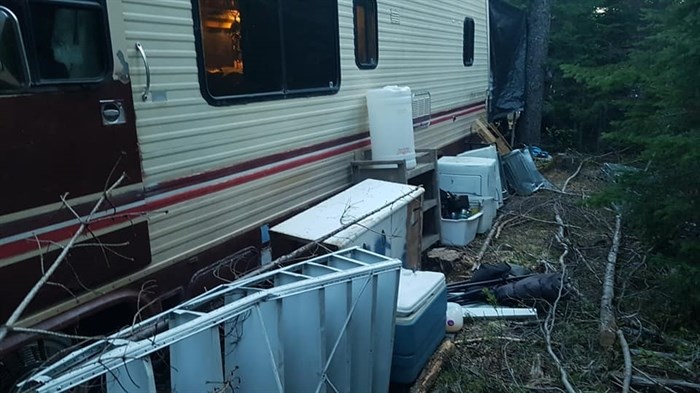Okanagan forest clean-up group founder sees increasing number of people living in forest
The founder of a Central Okanagan forest clean-up group is seeing increasing numbers of people living in the bush, to the point where "it's getting out of hand."
“More people are trying to make it up there because they can’t make it in town, I would say,” Okanagan Forest Task Force founder Kane Blake said, adding that he will assist with garbage cleanup if they want but for the most part leaves the campers alone.
Blake has been reluctant to publish locations of the camping sites as he doesn’t want people harassing campers, but regularly updates members of his group about the camping sites via the task force's Facebook group.
He thinks increasing housing and building costs may be a factor why people are living off the grid.
Blake said he comes across people fairly often that are “down on their luck."
“Whether it’s a divorce, or they can’t afford to live anymore, they sell everything they own to buy that motorhome or travel trailer just to say they own it and don’t have to worry about where their next month’s rent is coming from,” he said.
Task force members would see the occasional person camping out in the forest prior to the last year and a half but it wasn't like what they see now, he said.
"We can go up almost any road now and see somebody trying to make the best of it somewhere… it’s getting out of hand because some of these people aren’t keeping these sites clean," Blake said.
“Camping on crown lands is legal for up to two weeks as long as users are not violating natural resource laws. We would ask campers to use a leave-no-trace' ethic and to respect other users and wildlife,” said Tyler Hooper, public affairs officer with the Ministry of Forests, Lands, Natural Resource Operations and Rural Development, via email.
Enforcement may also be undertaken by the Conservation Officer Service or the RCMP depending on the issue and location, he said. Natural resource officers will patrol Crown lands for non-compliance and they also respond to complaints, he said.
To contact a reporter for this story, email Carli Berry or call 250-864-7494 or email the editor. You can also submit photos, videos or news tips to the newsroom and be entered to win a monthly prize draw.
We welcome your comments and opinions on our stories but play nice. We won't censor or delete comments unless they contain off-topic statements or links, unnecessary vulgarity, false facts, spam or obviously fake profiles. If you have any concerns about what you see in comments, email the editor in the link above.




